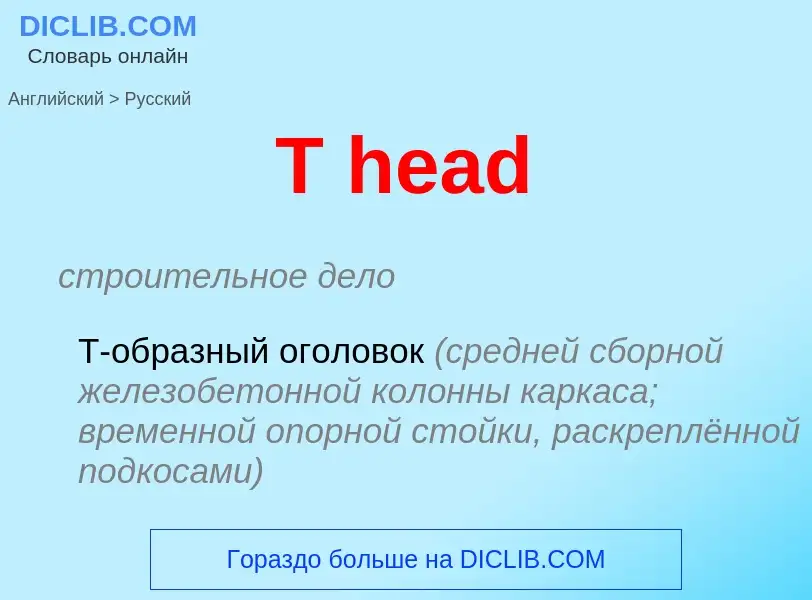Traducción y análisis de palabras por inteligencia artificial ChatGPT
En esta página puede obtener un análisis detallado de una palabra o frase, producido utilizando la mejor tecnología de inteligencia artificial hasta la fecha:
- cómo se usa la palabra
- frecuencia de uso
- se utiliza con más frecuencia en el habla oral o escrita
- opciones de traducción
- ejemplos de uso (varias frases con traducción)
- etimología
T head - traducción al ruso
строительное дело
Т-образный оголовок (средней сборной железобетонной колонны каркаса; временной опорной стойки, раскреплённой подкосами)
общая лексика
прямоугольная головка винта
Т-образная головка болта
Definición
. ·сокр. т. е., то есть; т. к., так как; и т. д. и так далее; и т. п., и тому подобное; т., том; тысяч.
Wikipedia
In linguistics, head directionality is a proposed parameter that classifies languages according to whether they are head-initial (the head of a phrase precedes its complements) or head-final (the head follows its complements). The head is the element that determines the category of a phrase: for example, in a verb phrase, the head is a verb. Therefore, head initial would be "VO" languages and head final would be "OV" languages.
Some languages are consistently head-initial or head-final at all phrasal levels. English is considered to be strongly head-initial (verbs precede their objects, for example), while Japanese is an example of a language that is consistently head-final. In certain other languages, such as German and Gbe, examples of both types of head direction occur. Various theories have been proposed to explain such variation.
Head directionality is connected with the type of branching that predominates in a language: head-initial structures are right-branching, while head-final structures are left-branching. On the basis of these criteria, languages can be divided into head-final (rigid and non-rigid) and head-initial types. The identification of headedness is based on the following:
- the order of subject, object, and verb
- the relationship between the order of the object and verb
- the order of an adposition and its complement
- the order of relative clause and head noun.
































![A stylized anchor plate in the cloister of the [[Church of St. Trophime, Arles]] (France) A stylized anchor plate in the cloister of the [[Church of St. Trophime, Arles]] (France)](https://commons.wikimedia.org/wiki/Special:FilePath/Cloître Saint-Trophime Anchor Plate 1.jpg?width=200)
![On a building in [[Petaluma, California]] On a building in [[Petaluma, California]]](https://commons.wikimedia.org/wiki/Special:FilePath/Genuine barnstar.jpg?width=200)
![Anchor plate on a church in [[North Rhine-Westphalia]] Anchor plate on a church in [[North Rhine-Westphalia]]](https://commons.wikimedia.org/wiki/Special:FilePath/Remscheid Lennep - Stadtkirche 04 ies.jpg?width=200)
![X-shaped wall anchor in [[Lower Saxony]] X-shaped wall anchor in [[Lower Saxony]]](https://commons.wikimedia.org/wiki/Special:FilePath/Oldendorf (Luhe) Wohlenbüttel - Wassermühle 05 ies.jpg?width=200)
![Bar-style wall anchor in [[Florence]] Bar-style wall anchor in [[Florence]]](https://commons.wikimedia.org/wiki/Special:FilePath/Florenz - Mauerbefestigung.jpg?width=200)
![A star-shaped anchor plate in [[New York City]] A star-shaped anchor plate in [[New York City]]](https://commons.wikimedia.org/wiki/Special:FilePath/Star in New York City Marble Cemetery (40635).jpg?width=200)
![A star-shaped anchor plate in Soulard, [[St. Louis]] A star-shaped anchor plate in Soulard, [[St. Louis]]](https://commons.wikimedia.org/wiki/Special:FilePath/Soulard St Louis Anchor Star.jpeg?width=200)
![An anchor plate in the cloister of the [[Church of St. Trophime, Arles]] (France) An anchor plate in the cloister of the [[Church of St. Trophime, Arles]] (France)](https://commons.wikimedia.org/wiki/Special:FilePath/Cloître Saint-Trophime Anchor Plate 2.jpg?width=200)
